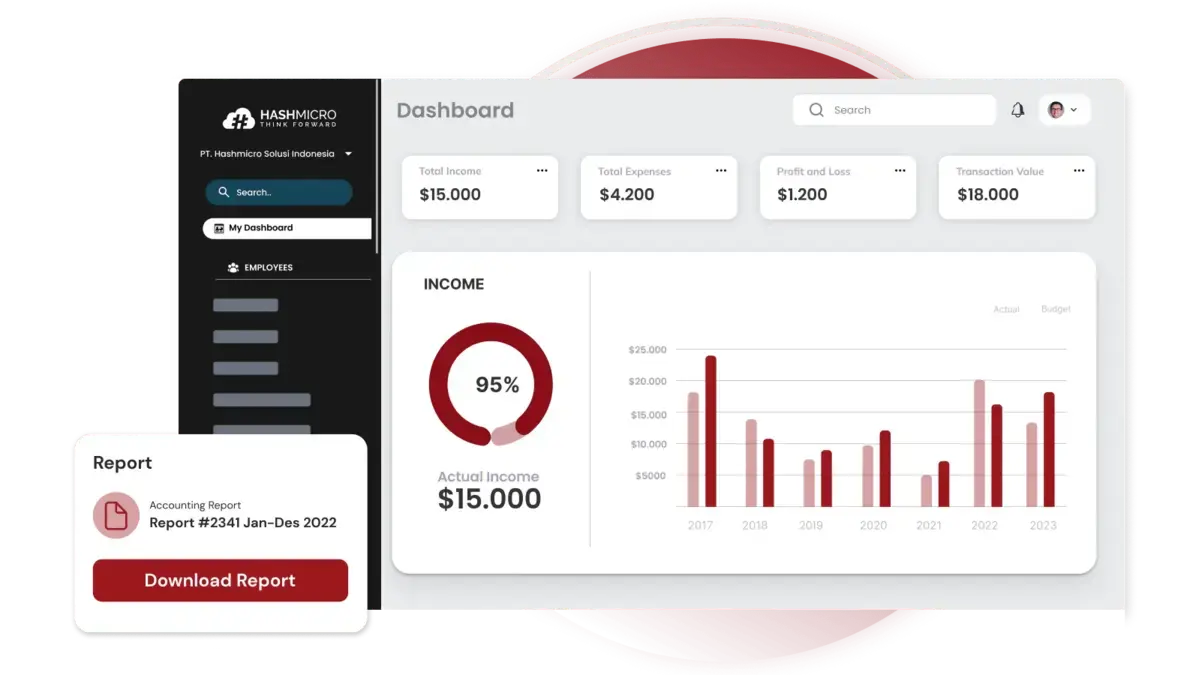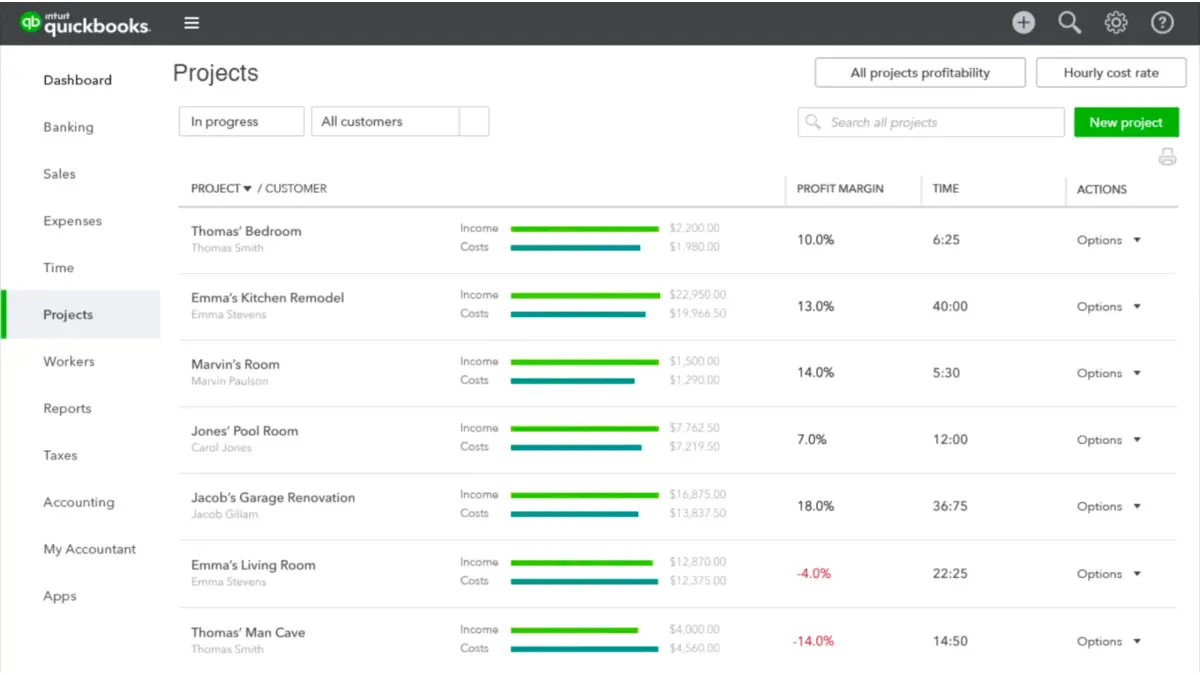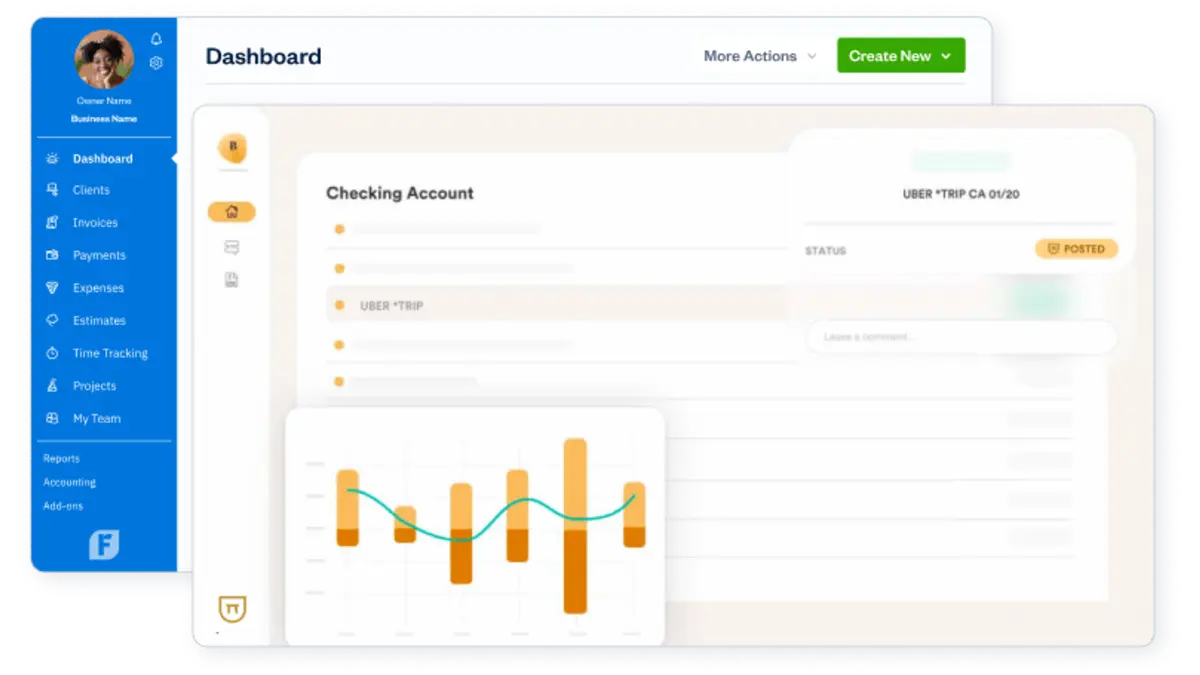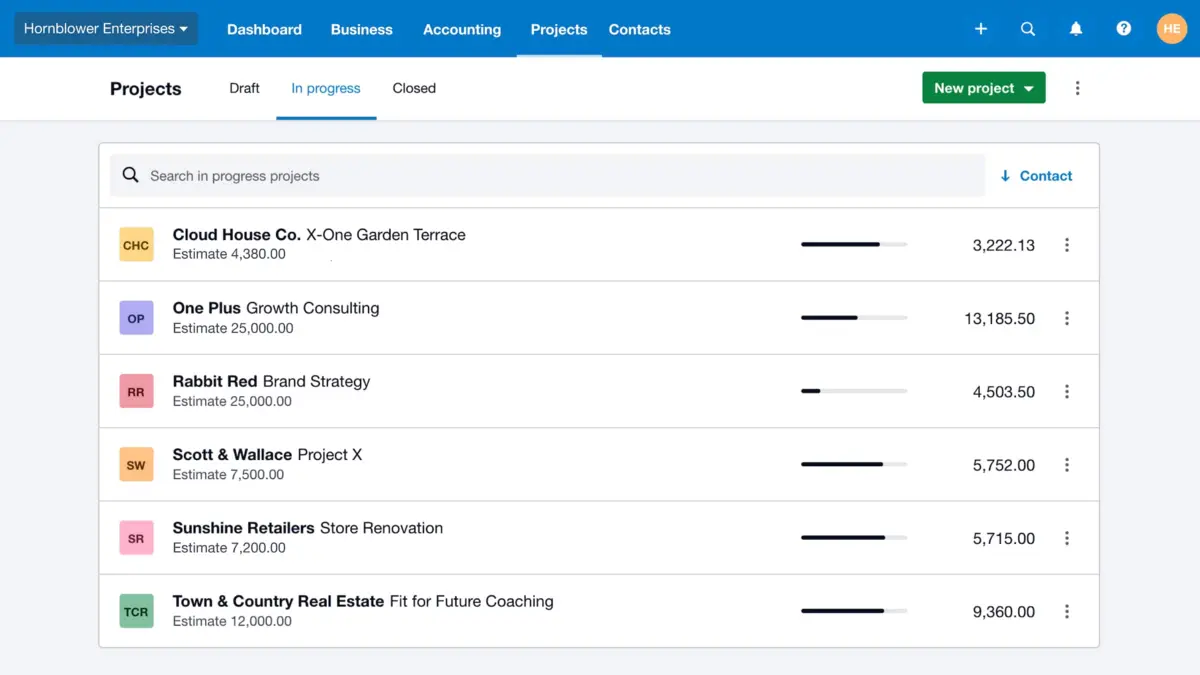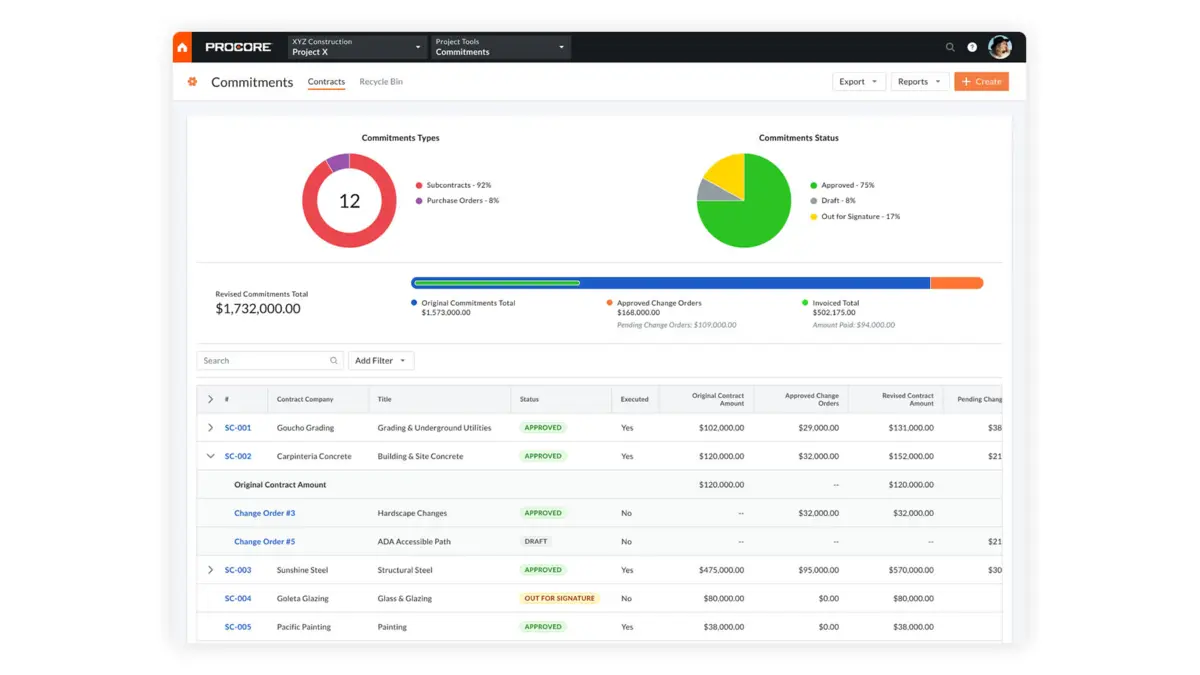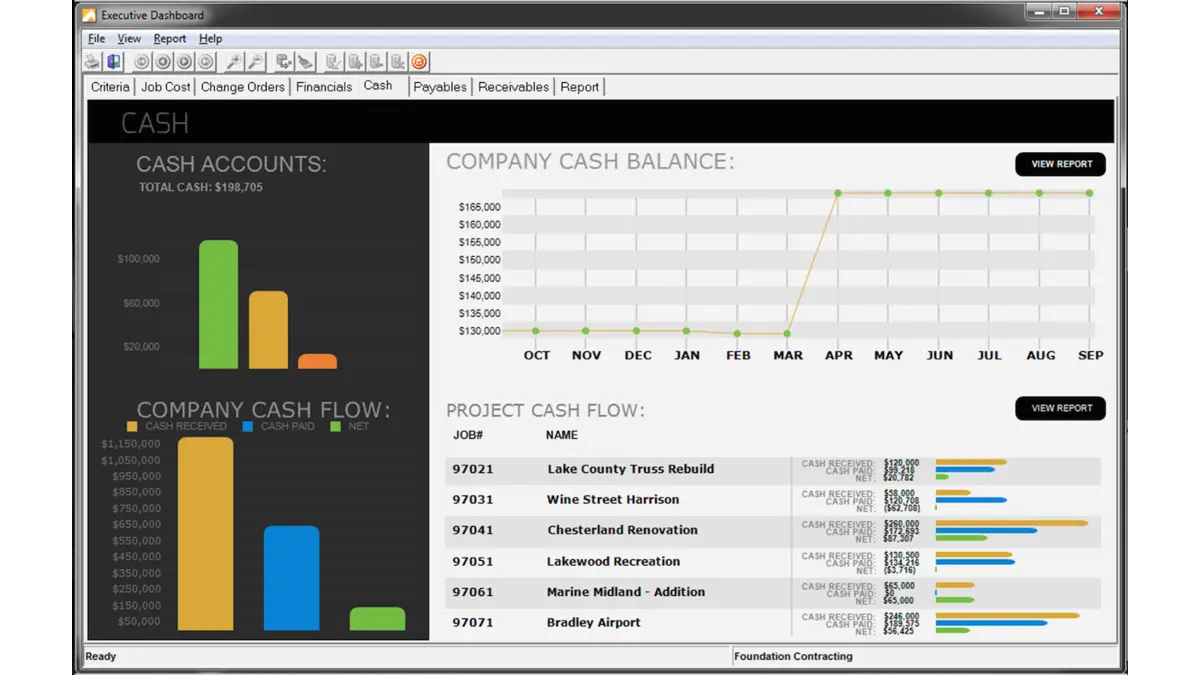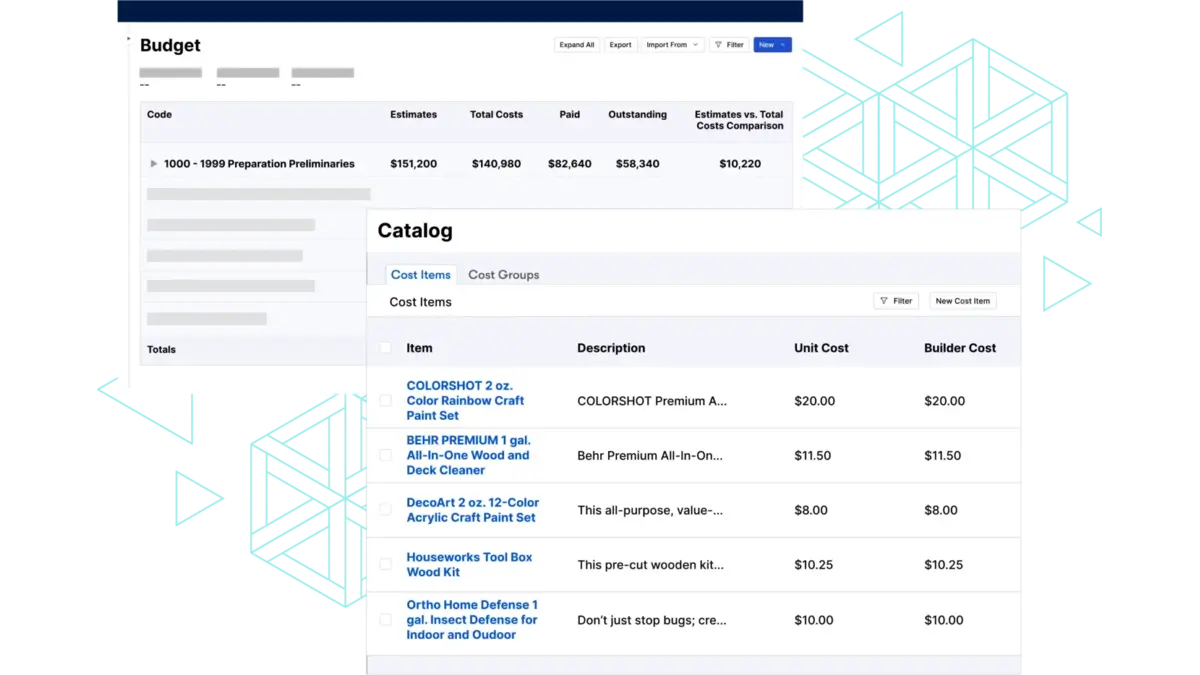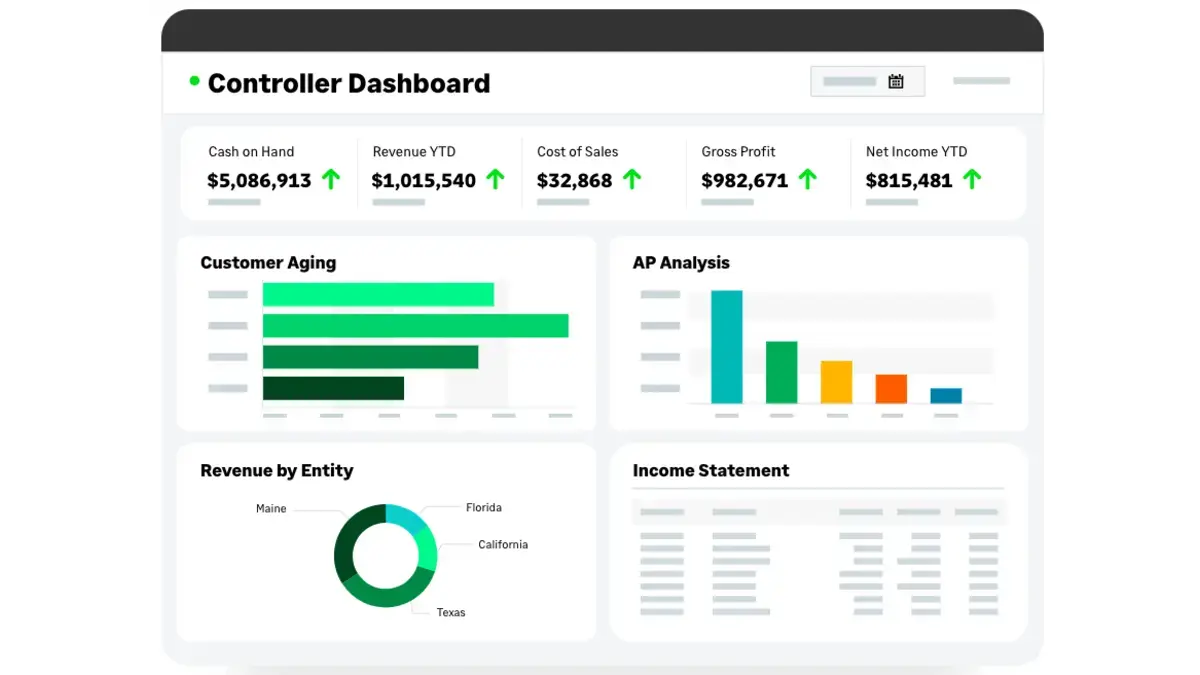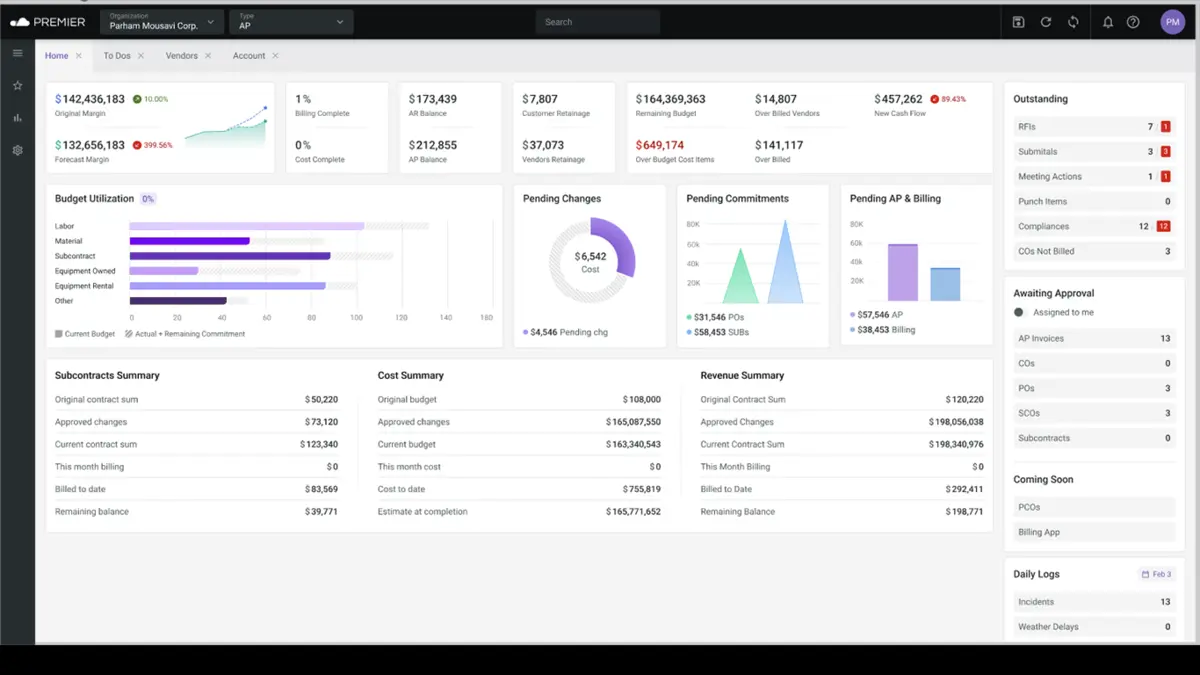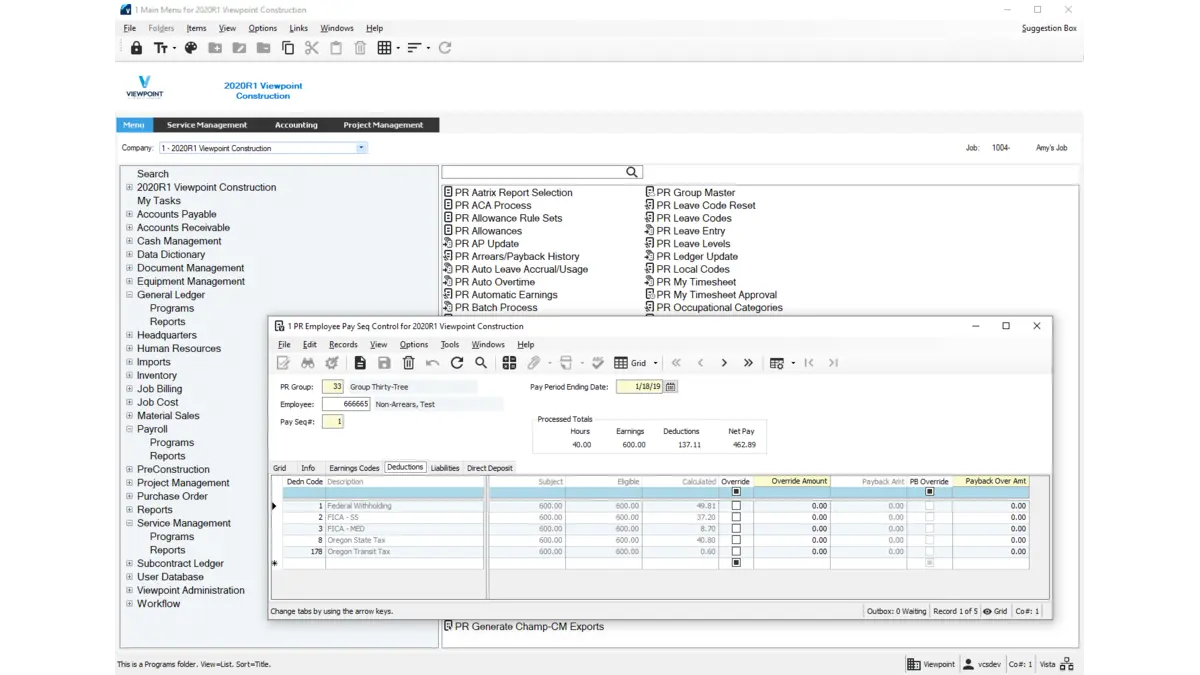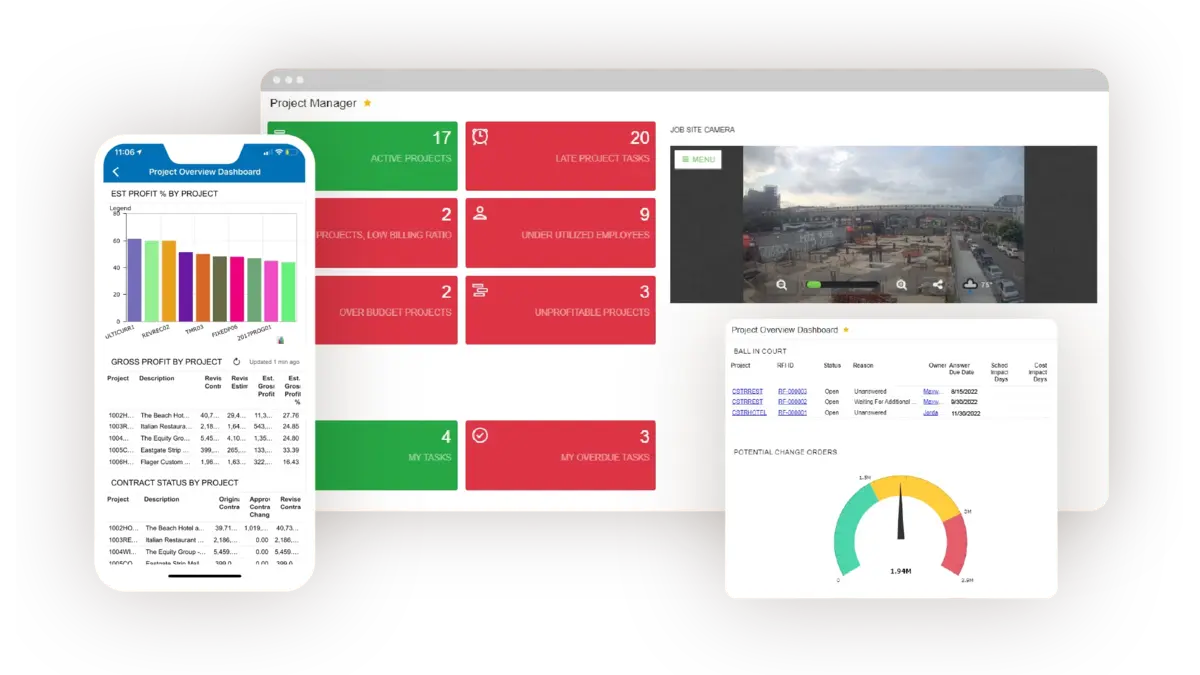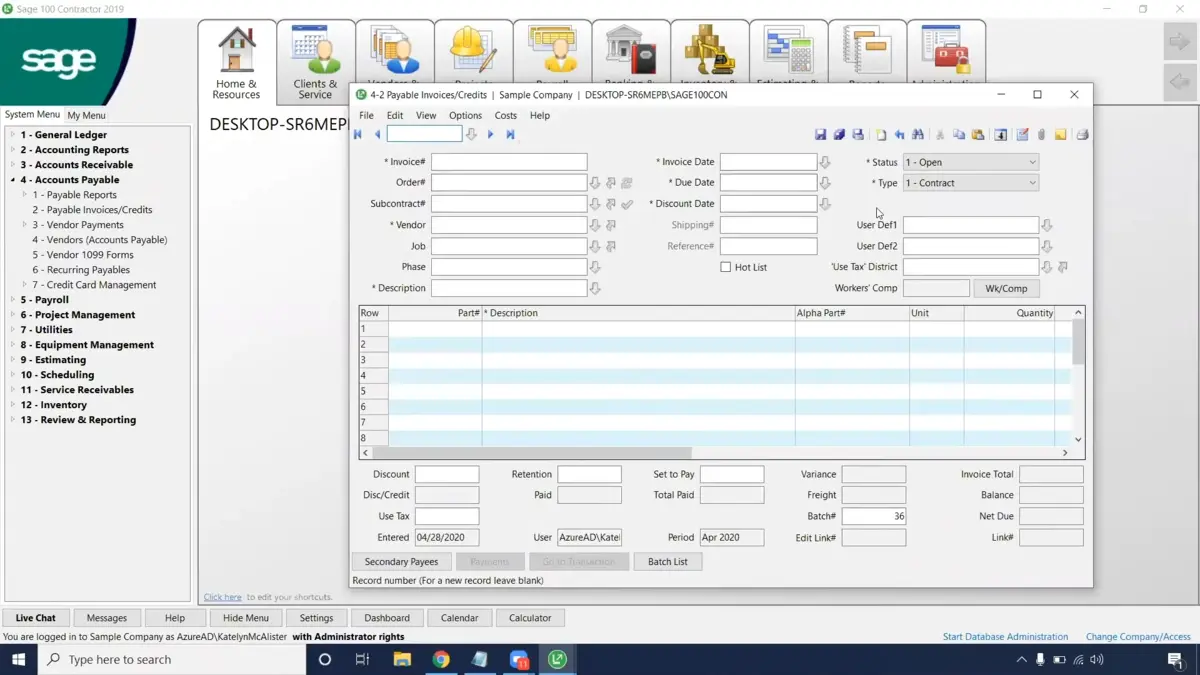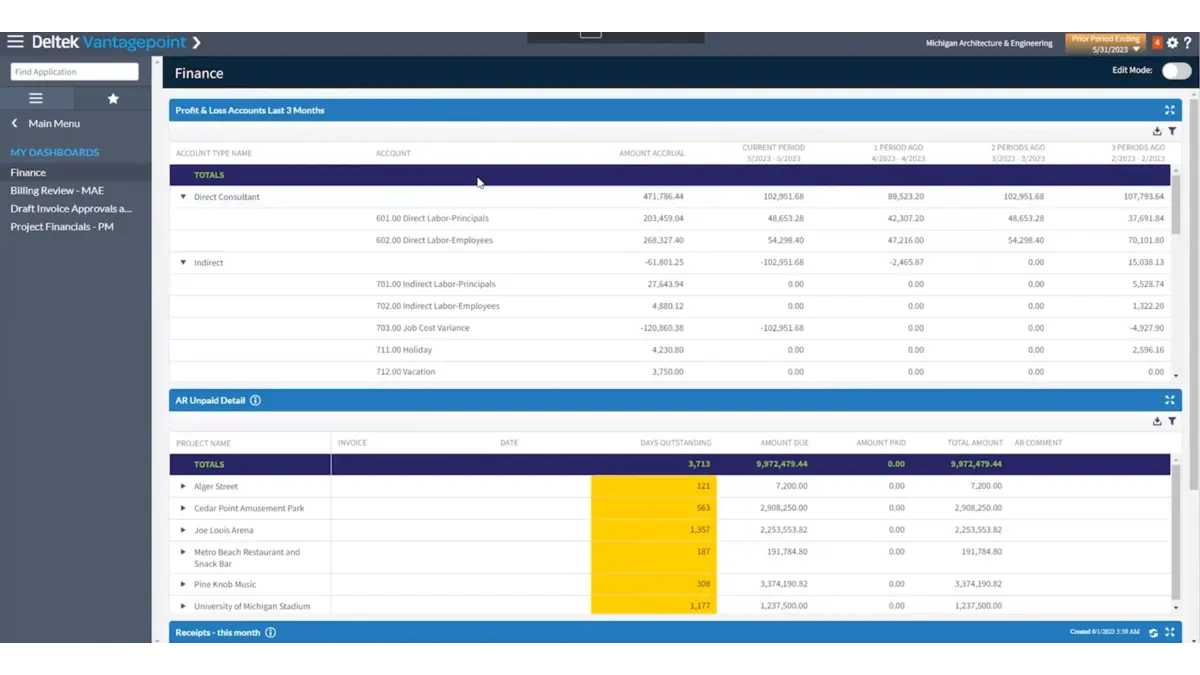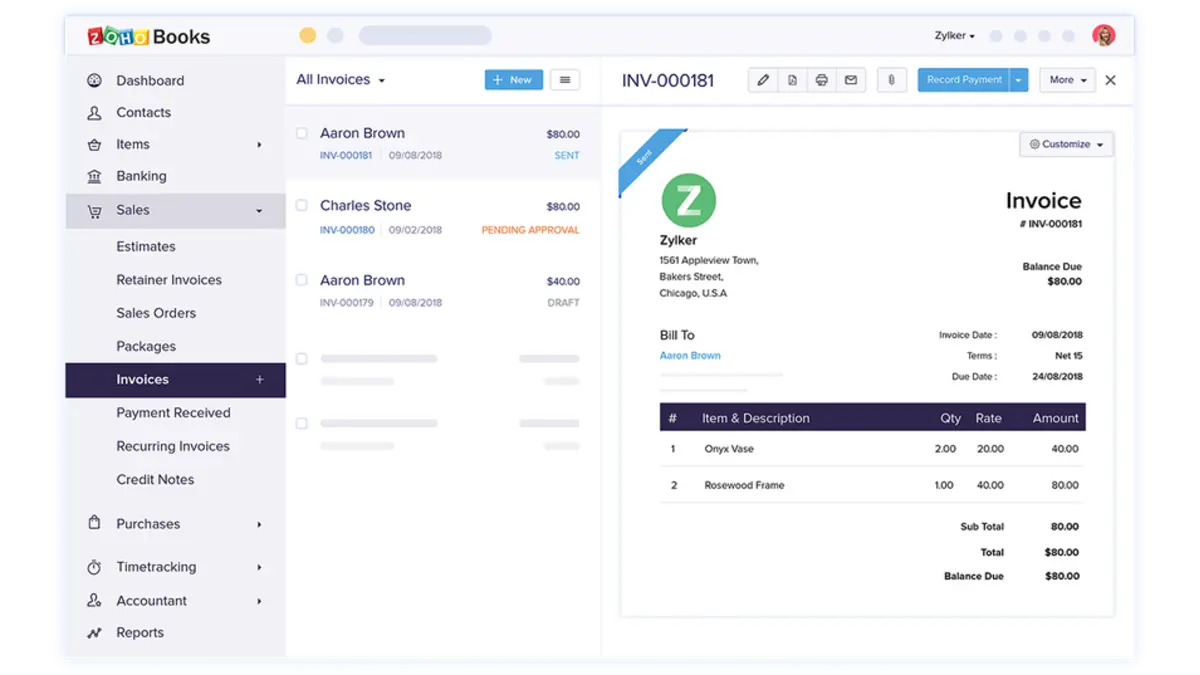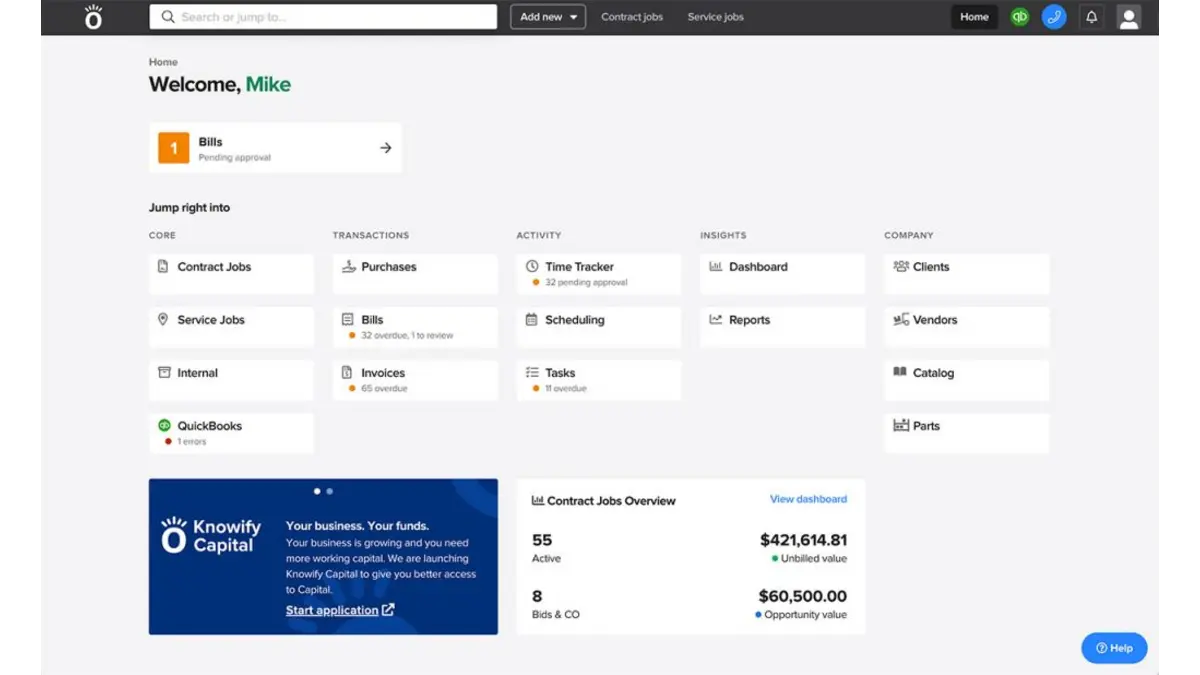Construction accounting software is a specialized tool designed to manage the financial aspects of construction projects. It integrates traditional accounting functions with project management features, enabling companies to track expenses, manage budgets, and ensure profitability.
However, with the vast selection of construction software available, choosing the right one can be challenging. Each option offers unique features and pricing structures, making it difficult for companies to determine which solution best fits their needs. Choosing the right construction software optimizes finances and boosts project efficiency.
Therefore, this article aims to provide detailed references and guidance to help companies choose the best accounting software for their specific needs. Understanding the key features, strengths, and weaknesses of each software can make a significant difference in making an informed decision.
By offering a comprehensive overview of the best 20 accounting software for construction companies in Singapore, this guide will serve as a valuable resource for companies looking to enhance their project budget management and overall financial efficiency.
Table of Content:
Table of Content
Key Takeaways
|
What is Construction Accounting Software?
Construction accounting software is a financial management tool tailored to construction companies’ needs. It combines accounting with project management, enabling effective finance management, cost tracking, and profitability through job costing, subcontractor management, and many more.
The benefits of construction accounting software are substantial, particularly in managing project budgets. It provides real-time visibility into project costs, enabling companies to track expenses and compare them against budgeted amounts.
This capability helps prevent cost overruns and ensures projects stay within financial limits. According to a survey by JBKnowledge, 41% of construction professionals believe that integrating accounting with project management software improves project cost control.
Additionally, the Construction Financial Management Association (CFMA) reports that firms using construction accounting software have seen a 15-20% increase in overall financial efficiency.
By automating complex financial tasks and providing comprehensive project insights, construction accounting software enhances decision-making, reduces administrative workload, and improves cash flow management.
This results in more accurate financial reporting and a clearer picture of a company’s financial health, ultimately leading to more successful project outcomes.
Criteria for Ideal Construction Accounting Software
Selecting the right accounting software for construction is crucial for maximizing efficiency and ensuring seamless project management. Here are key criteria to consider:
- Job costing: Accurate job costing is essential. The software should enable precise tracking of expenses per project, helping in budgeting and forecasting.
- Project management integration: Seamless integration with project management tools ensures accessible, up-to-date financial data, promoting better decision-making and tracking.
- Payroll management: Construction accounting software should manage complex payroll requirements, including varying pay rates, union dues, and legal compliance.
- Compliance and reporting: Comprehensive compliance management and robust reporting features ensure the software generates detailed financial reports and meets industry standards.
- Mobile access: Construction professionals often work on-site. Mobile access allows real-time data entry and retrieval, enhancing accuracy and efficiency.
- Scalability and customization: The software should be scalable to grow with the business and customizable to meet specific needs.
By ensuring these features, construction management software can effectively support the unique demands of construction projects and enhance overall operational efficiency.
20 Best Construction Accounting Software in Singapore 2024
Understanding the criteria for ideal construction accounting software discussed in the previous section sets the foundation for making an informed choice tailored to your business needs. With these criteria in mind, let’s explore the top options available in Singapore.
Here are the 20 best construction accounting software solutions for 2024, designed to enhance financial management and streamline project operations in the construction industry.
1. HashMicro construction accounting software
HashMicro’s construction accounting software is a robust cloud-based solution tailored to the financial management needs of construction businesses. It integrates essential accounting functions with advanced project management tools, ensuring comprehensive control over finances and operations.
HashMicro offers a free demo to prospective clients, allowing them to explore and experience firsthand how their construction accounting software works and the features it provides.
This hands-on trial demonstrates how the software can solve common financial problems in the construction business, such as managing cash flow, tracking project expenses, and ensuring compliance with local regulations.
By seeing the software in action, businesses can understand its capability to integrate accounting and project management functions, providing comprehensive financial control and operational efficiency.
Trusted by over 1.750 companies worldwide, HashMicro stands out for its customizable enterprise solutions that can cater to various industries’ needs, including construction.
Key features:
- Budget S-curve management: This feature lets users create budget S-curves, comparing planned vs. actual expenditure, aiding early financial performance tracking.
- S-curve plan vs actual project cost: This functionality uses S-curves to compare planned costs with actual expenses, highlighting cost overruns or savings for better control.
- S-curve plan vs actual project progress: This feature visualizes planned vs. actual progress with S-curves, aiding performance monitoring and ensuring timely completion.
- S-curve purchased/transferred/used project cost: It optimizes resources and manages costs by comparing expenses against the project budget using S-curves.
- In-depth budgeting type: This function enables detailed budgeting for materials, assets, petty cash, overheads, and subcontractors, ensuring thorough financial planning.
- Budget carry-over: The budget carry-over feature transfers unused funds to the next fiscal period, ensuring efficient reallocation and preventing waste.
- Reserved/purchased/used budget actualization: This feature tracks and updates budgets in real-time, ensuring accurate financial records and adjusted forecasts.
- In-depth budgeting method: It offers flexible budgeting based on product, type, contract, or group, enhancing financial precision and control.
- Subcontractor management: Efficient subcontractor management includes tracking agreements, payments, and compliance documentation.
- Change order management: This software manages change orders, ensuring that costs and timelines are adjusted accurately.
Strengths:
- User-friendly interface: HashMicro’s construction software has an intuitive interface, enabling quick user adaptation and enhancing productivity.
- Customizable: The software is highly customizable, allowing businesses to adapt its functionalities, ensuring growth and flexibility within the company.
- Unlimited users: HashMicro offers unlimited user access at no extra cost, enabling cost-effective collaboration for growing teams without financial constraints.
- Integration: The software integrates with CRM, ERP, and project management tools, ensuring smooth data flow and operational efficiency.
- Flexible hosting methods: HashMicro offers flexible hosting options, including cloud, on-premise, and hybrid, to align with business infrastructure and security needs.
- Mobile app: Users can access and update information in real-time from any location, enhancing on-site efficiency and keeping the team synchronized.
Weaknesses:
- Implementation period: The amount of time spent for implementation could vary depending on how many and how complex the features needed by the business.
If you’re interested in using HashMicro’s construction accounting software, you can ask for a price scheme file for free that they provide for prospective clients. So, you can estimate the budget to implement the software without having to commit first.
2. QuickBooks Enterprise
QuickBooks Enterprise is a robust accounting software designed to cater to the complex financial needs of medium to large-sized businesses, including those in the construction industry.
It offers advanced features for inventory management, payroll processing, and job costing, making it a comprehensive tool for managing business finances.
Key features:
- Job costing: Track expenses, revenues, and profits for each job or project.
- Inventory management: Multi-location tracking, barcode scanning, and stock tracking.
- Payroll management: Automated payroll processing and tax calculation.
- Multi-user access: Supports up to 40 simultaneous users with customizable permissions.
- Advanced reporting: Customizable financial, sales, and inventory reports
Strengths:
- Comprehensive financial management: Offers a wide range of accounting and financial tools tailored to business needs.
- Scalability: Supports growing businesses with advanced inventory and reporting features.
- Customizable reports: Allows users to create highly detailed and specific financial reports.
- User-friendly interface: Easy to navigate and use, even for non-accounting professionals.
Weaknesses:
- High cost: More expensive than other accounting software, particularly for small businesses.
- Complex setup: Initial setup and customization can be time-consuming and may require professional assistance.
- Limited mobile functionality: The mobile app lacks some features available on the desktop version.
- Resource-intensive: Requires substantial system resources, which can slow down performance on older computers.
3. FreshBooks
FreshBooks is a cloud-based accounting software designed for small to medium-sized businesses, including those in the construction industry.
It offers an intuitive interface that simplifies financial tasks like invoicing, expense tracking, and time management, making it an excellent choice for contractors and construction firms looking to streamline their accounting processes.
Key features:
- Invoicing: Create professional invoices quickly, customize them, and set up recurring billing.
- Expense tracking: Easily track business expenses by snapping photos of receipts and categorizing expenses.
- Time tracking: Log hours and associate them with specific clients or projects for accurate billing.
- Project management: Collaborate with team members, share files, and keep track of project progress and budgets.
- Mobile app: Access all features on the go with robust mobile applications for iOS and Android.
- Multi-currency support: Manage and invoice clients in multiple currencies seamlessly.
Strengths:
- User-friendly interface: Easy to navigate, even for those without an accounting background.
- Comprehensive mobile app: Full-featured mobile access allows for accounting tasks on the go.
- Excellent customer support: Highly rated for its responsive and helpful customer service.
- Scalable for small businesses: Ideal for small to medium-sized firms, offering features that grow with the business.
Weaknesses:
- Limited advanced features: This may lack some advanced accounting features needed by larger enterprises.
- Higher pricing for add-ons: Some essential features and integrations come at an additional cost.
- Limited customization: Customization options for invoices and reports can be somewhat restricted.
4. Xero Accounting
Xero Accounting is a cloud-based accounting software designed for small to medium-sized businesses, including construction companies.
This online accounting software offers a comprehensive suite of financial tools for construction to manage invoicing, bank reconciliation, bookkeeping, and more, all accessible from any device with an internet connection.
Key features:
- Bank reconciliation: Automatically import and categorize bank transactions.
- Invoicing: Create and send professional invoices with ease.
- Expense tracking: Monitor and record business expenses.
- Project management: Track project costs and profitability.
- Payroll integration: Integrate payroll for seamless employee payment management.
- Multi-currency: Handle transactions in multiple currencies.
- Mobile app: Access financial data and perform tasks on the go.
Strengths:
- User-friendly interface: Intuitive and easy to navigate, suitable for users with minimal accounting knowledge.
- Cloud-based accessibility: Access your accounts from anywhere, at any time, ensuring flexibility and convenience.
- Robust integration: Integrates with hundreds of third-party apps, enhancing functionality and streamlining workflows.
- Real-time updates: Automatic updates and real-time data synchronization keep financial information current.
Weaknesses:
- Limited customization: Some users find the customization options for reports and invoices lacking.
- Pricing: Higher subscription costs compared to some competitors, particularly for advanced features.
- Learning curve: Initial setup and learning to use all features effectively can be time-consuming.
5. Procore
Procore is a comprehensive cloud-based construction management software designed to streamline project workflows, improve team collaboration, and increase project efficiency.
It offers a suite of tools that cover project management, construction financials, quality and safety, and field productivity, making it a one-stop solution for construction professionals.
Key features:
- Project management: Includes tools for project scheduling, task management, document control, and collaboration.
- Construction financials: Provides budget tracking, cost management, contract management, and invoicing.
- Quality and safety: Features for inspection, compliance tracking, and incident reporting.
- Field productivity: Time tracking, daily logs, and workforce management.
Strengths:
- User-friendly interface: Intuitive and easy to navigate, reducing the learning curve for new users.
- Comprehensive feature set: Offers a wide range of tools that cover all aspects of construction management.
- Real-time collaboration: Facilitates instant communication and document sharing among team members.
- Scalable solution: Suitable for small projects to large-scale construction operations.
Weaknesses:
- High cost: This can be expensive, especially for small businesses or projects with limited budgets.
- Complex setup: Initial setup and configuration can be time-consuming and may require dedicated support.
- Integration challenges: Integrating with other software systems can sometimes be difficult.
- Performance issues: Users have reported occasional slow performance and lag, particularly with large data sets.
6. Foundation
Foundation Software is a comprehensive construction accounting software designed specifically for contractors.
It offers robust features to manage financials, job costing, payroll, and project management, helping construction companies streamline their accounting processes and enhance operational efficiency.
Key features:
- Job costing: Track costs accurately by job and see real-time profitability.
- Payroll management: Handle complex payroll needs, including union rates and multi-state taxes.
- Accounts payable and receivable: Manage invoices, payments, and cash flow efficiently.
- General ledger: Maintain a detailed and accurate record of all financial transactions.
- Project management: Oversee project budgets, schedules, and resources effectively.
Strengths:
- User-friendly interface: Intuitive and easy-to-navigate interface, making it accessible for users with varying levels of technical expertise.
- Scalability: Suitable for both small contractors and larger construction firms, with features that grow alongside the business.
- Strong payroll capabilities: Handles complex payroll requirements, including certified payroll, union payroll, and multi-state taxes.
- Comprehensive reporting: Offers a wide range of customizable reports, giving detailed insights into financial and project performance.
Weaknesses:
- Steep learning curve: Initial setup and learning can be time-consuming and may require dedicated training.
- Opaque pricing: Lack of transparent pricing details can make it difficult for potential buyers to estimate costs.
- Limited customization: Some users may find the customization options limited compared to other software.
- Mobile app limitations: The mobile app functionality is less robust compared to the desktop version, which can limit on-the-go usability.
7. BuilderTREND
BuilderTREND is a comprehensive construction management software designed for residential construction professionals.
It offers an all-in-one platform to manage various aspects of construction projects, including project scheduling, financial management, customer relations, and service management.
Key features:
- Project scheduling: Tools for creating and managing project timelines.
- Financial management: Budgeting, cost tracking, and invoicing functionalities.
- Customer relationship management (CRM): Managing client interactions, communications, and documentation.
- Service management: Features for handling service requests and warranties.
- Document management: Storage and organization of project documents.
- Time tracking: Monitoring employee and subcontractor work hours.
- Mobile access: Accessibility via mobile devices for on-the-go management.
Strengths:
- Comprehensive features: Combines project management, financial management, and CRM in one platform.
- User-friendly interface: Intuitive design that is easy to navigate.
- Mobile accessibility: Manage projects from anywhere with mobile access.
- Client communication: Enhances client relations with integrated communication tools.
- Integration capabilities: Works well with other popular software like QuickBooks and Xero.
Weaknesses:
- Pricing: Higher subscription costs compared to some competitors.
- Complexity: This may require a learning curve for new users.
- Customer support: Some users report delays in support response times.
- Customization: Limited customization options for specific needs.
- Feature overload: This can be overwhelming for smaller companies needing fewer functionalities.
8. Sage Intacct
Sage Intacct is a cloud-based financial management software designed to streamline accounting processes and enhance financial visibility for businesses, including construction companies.
It integrates core accounting functions with advanced features such as AI-powered analytics and real-time financial reporting.
Key features:
- Accounts receivable and payable: Efficiently manage billing and payments.
- General ledger: Customizable ledger for detailed financial tracking.
- Project accounting: Track costs, revenue, and profitability by project.
- Multi-entity management: Simplifies accounting for complex organizational structures.
- Time and expense management: Streamline tracking and reimbursement processes.
- Financial reporting: Generate real-time, AI-driven financial reports and dashboards.
Strengths:
- Scalability: Adapts easily to growing business needs.
- Advanced integration: Seamlessly integrates with other business systems.
- User-friendly interface: Intuitive design simplifies navigation and use.
Weaknesses:
- Cost: Higher pricing compared to some competitors.
- Implementation complexity: May require significant time and resources to set up.
- Customization limitations: Certain advanced features may lack customization options.
9. Premier
Premier Construction Software is a cloud-based construction management and accounting software designed to meet the needs of general contractors, developers, homebuilders, and speciality contractors.
It combines advanced financial management with project management tools to enhance efficiency and collaboration across all project phases.
Key features:
- Job costing: Track project costs in real-time for accurate budgeting and forecasting.
- Project management: Integrate financial and project data for seamless coordination.
- Billing and invoicing: Streamline the billing process with automated invoicing and payment tracking.
- Financial management: Advanced accounting features, including payroll, cash flow management, and financial reporting.
- Mobile access: Accessible from any device, allowing for on-the-go management.
- AI/automation: Utilize predictive intelligence and automation for better decision-making.
Strengths:
- Comprehensive integration: Combines accounting and project management in one platform, reducing the need for multiple software solutions.
- Ease of use: Intuitive interface that simplifies training and daily operations.
- Cloud-based accessibility: Accessible from any device, facilitating real-time updates and remote management.
- Robust customer support: Highly rated support team that provides timely assistance and continuous updates.
Weaknesses:
- Complex initial setup: Users have reported difficulties during the initial implementation phase.
- Reporting limitations: Some users find the standard reports lacking, requiring custom report generation.
- Limited customization for certain roles: Features may not fully meet the needs of real estate developers and other specific sectors.
- Dependence on internet access: As a cloud-based solution, performance can be hindered by internet connectivity issues.
10. RedTeam
RedTeam is a comprehensive construction management software designed to streamline project management, financial operations, and collaboration for construction companies of all sizes.
This accounting software for contractors offers a suite of tools to manage every aspect of a construction project, from initial bid to project closeout.
Key features:
- Project management: Integrated project management tools including scheduling, document management, and real-time collaboration.
- Financial management: In-depth financial tools for budgeting, job costing, and financial reporting.
- Bid management: Tools to manage bids, proposals, and subcontractor agreements.
- Time tracking: Time and attendance tracking for workforce management.
Strengths:
- User-friendly interface: Intuitive and easy to navigate, making it accessible for all team members.
- Real-time collaboration: Facilitates seamless communication and collaboration among project teams, both in the office and on-site.
- Comprehensive financial tools: Robust financial management features that cover all aspects of construction accounting.
- Mobile accessibility: Offers mobile apps that enable on-site project management and real-time updates.
Weaknesses:
- Pricing transparency: Pricing details are not readily available on the website, requiring potential customers to contact for quotes.
- Limited integrations: Fewer integration options compared to other leading construction management software.
- Cloud-based dependency: Relies heavily on internet connectivity for optimal performance.
11. Viewpoint Vista
Viewpoint Vista is an integrated construction management and accounting software designed to cater to the needs of large contractors.
It seamlessly combines financial management with comprehensive project management tools, providing a robust solution for managing complex construction projects.
Key features:
- Job costing: Tracks detailed project costs, labor, and materials.
- Payroll management: Automates payroll processes, including tax calculations and compliance.
- Project management: Offers tools for managing contracts, subcontracts, change orders, and RFIs.
- Accounts payable/receivable: Manages vendor payments and client invoices efficiently.
- Reporting and analytics: Provides customizable reports and dashboards for project and financial performance insights.
Strengths:
Comprehensive integration: Combines financial and project management in one platform, reducing the need for multiple software solutions.
Detailed cost tracking: Allows for precise job costing, helping manage budgets and avoid cost overruns.
Mobile accessibility: Enhances field-to-office communication with real-time data access via mobile devices.
Weaknesses:
- Complex setup: The initial setup can be time-consuming and may require extensive user training.
- High cost: It can be expensive, particularly for smaller contractors.
- Performance issues: Some users report slow performance, especially with larger datasets.
- User interface: The interface may not be as modern or intuitive compared to other software solutions.
12. Acumatica
Acumatica is a comprehensive cloud-based construction accounting software designed to streamline financial management and operational workflows for construction companies of all sizes.
It integrates core accounting functions with robust project management features, allowing for efficient management of finances, project costs, and compliance.
Key features:
- Job costing: Tracks project costs and profitability in real time.
- Project management: Integrates with accounting to provide detailed project tracking and reporting.
- Payroll management: Handles complex payroll needs, including union reporting and compliance.
- Mobile access: Provides on-the-go access to financial and project data.
- Reporting and dashboards: Offers customizable reports and dashboards for financial and project insights.
Strengths:
- Comprehensive integration: Combines accounting, project management, and CRM in one platform, reducing the need for multiple systems.
- Scalability: Suitable for businesses of all sizes, from small contractors to large enterprises.
- User-friendly interface: Intuitive design that simplifies navigation and data entry.
- Real-time data: Provides up-to-date financial and project information, enhancing decision-making.
Weaknesses:
- Customization complexity: Some users find the customization options overwhelming and challenging without technical support.
- Cost: This can be expensive for smaller companies, especially when adding advanced features.
- Learning curve: Initial setup and learning can be time-consuming for new users.
- Limited offline access: As a cloud-based solution, it requires internet access, which can be a limitation in areas with poor connectivity.
13. Sage 100 Contractor
Sage 100 Contractor is a robust construction accounting software designed to meet the specific needs of small to mid-sized construction firms.
It combines project management tools with comprehensive financial management capabilities, allowing contractors to manage all aspects of their business from a single platform.
Key features:
- Job costing: Provides detailed tracking of project costs to help maintain budgets and improve profitability.
- Project management: Tools for scheduling, resource management, and project tracking.
- Payroll processing: Handles complex payroll requirements, including union wages and certified payroll.
- Accounts payable/receivable: Manages invoices, payments, and cash flow efficiently.
- Reporting and analytics: Generates customizable reports and provides real-time financial insights.
Strengths:
- Integrated project management: Combines financial and project management tools for seamless operation.
- User-friendly interface: Easy to navigate, reducing the learning curve for new users.
Weaknesses:
- Limited mobile functionality: Some users find the mobile app lacking in features compared to the desktop version.
- Complex setup: Initial setup can be time-consuming and may require technical support.
- Cost: Higher price point compared to some competitors, which might be a barrier for very small businesses.
- Separate modules for inventory management: Inventory management requires an additional module, which adds to the overall cost.
14. Odoo Accounting
Odoo Accounting is an open-source, cloud-based accounting software designed to streamline financial processes for businesses of all sizes. It integrates seamlessly with other Odoo applications, providing a comprehensive business management solution.
Key features:
- General ledger: Manage all financial transactions and track company finances.
- Accounts payable/receivable: Handle invoices, bills, and payments efficiently.
- Bank reconciliation: Sync bank statements and automate reconciliations.
- Multi-currency support: Manage transactions in multiple currencies.
- Expense management: Track and manage business expenses and reimbursements.
- Financial reporting: Generate detailed reports like profit and loss statements.
Strengths:
- Integration: Seamlessly integrates with other Odoo apps (CRM, Inventory, Sales), enhancing overall business efficiency.
- Customizability: Highly customizable through Odoo Studio, allowing businesses to tailor the software to their specific needs.
- Cost-effective: Offers a free tier and affordable subscription plans, making it accessible for small and medium-sized businesses.
- User-friendly interface: Easy to navigate with an intuitive design, reducing the learning curve for new users.
Weaknesses:
- Limited automation: Lacks advanced automation features in areas like bank reconciliation, requiring more manual intervention.
- Frequent system crashes: Users have reported occasional system instability, which can disrupt workflows.
- Expensive for small companies: Some features are only available in higher-priced plans, which can be costly for very small businesses.
- Complex setup: Initial setup and customization can be complex and may require technical expertise.
15. CMiC
CMiC Enterprise is an all-encompassing construction management software designed to streamline project delivery and financial management.
It offers robust functionalities tailored specifically for the construction industry, enabling seamless integration across various business processes.
Key features:
- Project management: Comprehensive tools for planning, executing, and monitoring projects.
- Financial management: Advanced financial modules for budgeting, forecasting, and real-time financial reporting.
- Document management: Centralized repository for storing, sharing, and managing documents.
- Mobile access: Mobile-friendly interface for on-the-go project and financial management.
- HR and payroll: Integrated human resources and payroll management systems.
- Business intelligence: Powerful analytics and reporting tools for data-driven decision making.
Strengths:
- Comprehensive integration: Seamlessly integrates various business functions, reducing data silos and enhancing collaboration.
- Scalability: Suitable for small to large enterprises, accommodating growth and increasing project complexity.
- Real-time reporting: Provides real-time insights into project and financial data, aiding in timely decision-making.
- User-friendly interface: Intuitive and mobile-friendly, allowing easy access and management on the go.
Weaknesses:
- Complex implementation: The initial setup can be time-consuming and may require professional assistance.
- Cost: Higher upfront costs, which may not be feasible for smaller companies.
- Customization: Limited customization options can be a drawback for businesses with unique requirements.
- Training requirement: Users may need extensive training to fully leverage all features.
16. Deltek
Deltek is a comprehensive construction accounting software designed to streamline financial management and project tracking for construction companies.
It integrates essential accounting functions with robust project management tools, ensuring efficient handling of finances, resources, and operations.
Key features:
- Job costing: Detailed tracking of job-related costs to ensure projects stay within budget.
- Project management: Tools to manage project schedules, resources, and tasks effectively.
- Payroll processing: Comprehensive payroll management, including labor cost allocation.
- Subcontractor management: Manage contracts, payments, and compliance with subcontractors.
- Mobile access: Accessible via mobile devices for real-time updates and data entry on the go.
- Financial reporting: Generate detailed financial reports and analytics for informed decision-making.
Strengths:
- Comprehensive integration: Seamlessly integrates accounting and project management functions, providing a unified platform for construction companies.
- Scalable solutions: Suitable for small to large construction firms, with scalable features that grow with the business.
- User-friendly interface: Offers a modern, intuitive interface that simplifies complex financial and project management tasks.
Weaknesses:
- Cost: Higher pricing compared to some competitors, which may be a barrier for smaller firms.
- Complexity: The initial setup and learning curve can be steep, requiring time and training for full utilization.
- Customization limitations: Some users may find the customization options limited compared to other specialized solutions.
- Support: Customer support can be slow at times, leading to delays in resolving issues.
17. Zoho Books
Zoho Books is a cloud-based accounting software designed for small to medium-sized businesses. It simplifies the management of finances by offering comprehensive tools for tracking income and expenses, managing client invoices, and ensuring tax compliance.
This accounting software integrates seamlessly with other Zoho apps, providing a unified platform for business operations.
Key features:
- Invoicing: Create and send professional invoices with customizable templates.
- Expense tracking: Monitor expenses and categorize them for better financial oversight.
- Bank reconciliation: Automatically import bank statements and reconcile accounts.
- Inventory management: Track inventory levels, manage stock, and generate purchase orders.
- Project management: Link expenses and income to specific projects for detailed tracking.
- Multi-currency handling: Manage transactions in multiple currencies with real-time exchange rates.
- Automation: Automate workflows for recurring invoices, payment reminders, and more.
Strengths:
- User-friendly interface: Zoho Books is known for its intuitive and easy-to-navigate interface, making it accessible for users with varying levels of accounting knowledge.
- Comprehensive feature set: It offers a wide range of features, including invoicing, expense tracking, bank reconciliation, and inventory management.
- Integration capabilities: Seamlessly integrates with other Zoho applications and third-party tools like payment gateways and CRM systems.
- Automation: Automates repetitive tasks such as recurring invoices and payment reminders, saving time and reducing errors.
Weaknesses:
- Limited customization: Some users find the customization options for reports and templates to be limited compared to other accounting software.
- Mobile app limitations: While useful, the mobile app lacks some functionalities available on the desktop version.
- Customer support: Users have reported that customer support response times can be slow, particularly for complex issues.
- Advanced features: Larger businesses may find Zoho Books lacking in advanced features needed for more complex accounting tasks.
18. Knowify
Knowify is a cloud-based construction management and accounting software designed to streamline project, financial, and administrative tasks for construction businesses.
It offers an all-in-one platform to manage jobs, contracts, scheduling, invoicing, and real-time tracking, ensuring enhanced efficiency and profitability for construction projects of all sizes.
Key features:
- Job costing: Track costs and profits on each project, ensuring accurate financial management.
- Invoicing: Create and send customized invoices, with electronic payment options to expedite payments.
- Time tracking: Workers can clock in and out using a mobile app, simplifying payroll processes.
- Subcontractor management: Efficiently manage subcontractor agreements, payments, and compliance documentation.
- Project management: Schedule tasks, track progress, and monitor job site activities seamlessly.
Strengths:
- User-friendly interface: Easy to navigate, with a modern design that enhances user experience.
- Customization: Offers various templates for invoicing and proposals, giving a professional edge to bids and documentation.
- Integration capabilities: Syncs with QuickBooks, Square, and other popular software, enhancing functionality.
Weaknesses:
- Limited customization: Some users find the customization options inadequate for more complex needs.
- Learning curve: Some users report a steep learning curve for certain advanced features.
- Cost: Higher-end features can drive up subscription costs, which might be a consideration for smaller businesses.
19. CoConstruct
CoConstruct is a comprehensive construction management software designed specifically for custom home builders and remodelers. It streamlines project, financial, and client management processes, providing a unified platform to manage all aspects of construction projects.
Key features:
- Single-entry estimating: Simplifies the process of creating accurate estimates.
- Change order approvals: Facilitates the management and approval of change orders.
- Invoicing: Streamlines the billing process with customizable invoice templates.
- Project tracking: Tracks progress and ensures that projects stay on schedule.
- Scheduling: Manages project timelines and synchronizes schedules.
- Client and contractor management: Organizes and manages client and contractor information.
- Budgeting and forecasting: Provides tools to manage project budgets and forecast expenses.
Strengths:
- Comprehensive project management: Integrates various project management tools, making it easy to handle multiple tasks within a single platform.
- User-friendly interface: Intuitive and easy to navigate, reducing the learning curve for new users.
- Effective communication: Enhances collaboration with built-in communication tools.
- Mobile accessibility: Provides the flexibility to manage projects from anywhere using the mobile app.
Weaknesses:
- Pricing: Higher cost compared to some competitors, which may be a barrier for smaller companies.
- Complexity for simple projects: May be overkill for very small projects due to its extensive features.
- Limited customization: Some users find the customization options to be limited.
- Initial setup: This can be time-consuming to set up initially, requiring a significant investment of time.
20. COINS
COINS (Construction Industry Solutions) is a comprehensive construction management software designed to streamline and optimize various aspects of construction projects.
It integrates accounting, project management, and operations into a single platform to enhance efficiency and decision-making for construction companies.
Key features:
- Job costing and financials: Real-time job costing, budget tracking, and financial reporting.
- Project management: Tools for project planning, scheduling, and resource allocation.
- Procurement: Streamlined procurement processes including supplier management and purchase orders.
- Subcontractor management: Efficiently manage subcontractor contracts, compliance, and payments.
- Mobile accessibility: Mobile apps for field data entry and real-time project updates.
- Business intelligence: Advanced analytics and reporting tools for data-driven insights.
Strengths:
- Comprehensive integration: Integrates various aspects of construction management into one platform, reducing the need for multiple software solutions.
- Real-time data: Provides real-time data and insights, enhancing decision-making and project oversight.
- Scalability: Suitable for businesses of various sizes, from small contractors to large construction firms.
Weaknesses:
- Complexity: The extensive features may have a steep learning curve for new users.
- Cost: Higher initial investment compared to some other construction accounting solutions.
- Customization needs: This may require significant customization to fit specific business processes.
- User interface: Some users find the interface less intuitive compared to modern cloud-based solutions.
How to Choose the Right Accounting Software for Your Construction Business
As we have explored the top construction accounting solutions available in Singapore for 2024, it is clear that choosing the right software is critical for optimizing financial management and project efficiency. Picking the most suitable choices for your business will determine whether you gain the benefits of construction accounting software optimally or not.
With numerous options on the market, selecting the best fit for your business can be challenging. Choosing the right construction accounting software involves evaluating several factors to ensure it meets your business’s specific needs:
- Identify your needs: Start by assessing your company’s needs, project size, user number, and required features like job costing and payroll management.
- Integration capabilities: Ensure the software seamlessly integrates with project management, CRM, and ERP systems to streamline workflows and reduce data duplication.
- Scalability: Choose software that scales with your business, handling increased project size and complexity without performance issues.
- User-friendliness: A user-friendly interface is crucial for quick adoption and efficiency. Look for software that offers intuitive navigation and requires minimal training.
- Mobile access: Mobile access is essential; ensure the software offers robust functionality for real-time data entry and project updates.
- Customer support and training: Choose a vendor with comprehensive support and training to address issues promptly and ensure effective software use.
- Cost and ROI: Consider total ownership costs, including subscription, implementation, support, and upgrades, and evaluate ROI by improved efficiency.
By carefully evaluating these factors, you can choose construction accounting software that aligns with your business needs, enhances operational efficiency, and supports your company’s growth.
Conclusion
Construction accounting software is a specialized tool that integrates accounting with project management, tailored for the construction industry. The ideal software should offer essential features that could enhance the accounting process in construction companies.
Before choosing construction accounting software, you need to ensure that it has all the ideal criteria and suits your business needs the most.
HashMicro’s construction accounting software is a top choice in Singapore that check marked all the criteria in the list. It offers robust project management, real-time financial reporting, and mobile accessibility.
For a firsthand experience, we encourage you to try HashMicro’s free demo offer. This hands-on trial will help you explore the software’s features and see how it can enhance your company’s financial management and project efficiency.
Visit HashMicro’s website today to request your free demo!
FAQ about Construction Accounting Software
-
How does construction accounting software help manage cash flow?
construction accounting software helps manage cash flow by providing real-time financial tracking and reporting, ensuring that all expenses and revenues are accurately recorded. It allows businesses to forecast cash flow needs, monitor payment schedules, and manage accounts payable and receivable efficiently.
This comprehensive oversight helps prevent cash shortages and enables better financial planning, ensuring that projects are adequately funded at all times.
-
Can construction accounting software handle job costing and project management?
Yes, construction accounting software can handle job costing and project management. It enables precise tracking of all costs associated with a project, including labor, materials, and overheads.
For example, software like HashMicro’s Construction software provides robust job costing features that allow for detailed tracking of labor, materials, and other project-related expenses. This ensures accurate cost management and project profitability.
-
How does construction accounting software ensure compliance with local regulations?
Construction accounting software, such as the one provided by HashMicro, ensures compliance with local regulations by incorporating features that adhere to Singapore’s financial reporting standards and tax laws.
The software automates compliance-related tasks such as tax calculations, statutory reporting, and audit trails. It also keeps up-to-date with regulatory changes, ensuring that businesses remain compliant with the latest requirements, thus reducing the risk of legal issues and penalties.
-
What are the benefits of integrating construction accounting software with other systems?
Integrating construction accounting software with other systems, such as ERP systems, CRM, and project management tools, offers several benefits. It enables seamless data flow across different business functions, reducing data duplication and entry errors.
This integration enhances overall operational efficiency, provides a holistic view of the business, and supports informed decision-making. For instance, integrating with an ERP software can streamline procurement software and inventory management software, while CRM integration can improve client communication and project tracking.
-
Is construction accounting software compatible with mobile devices?
Many construction accounting software solutions are compatible with mobile devices, including HashMicro’s construction accounting software. This mobile compatibility allows users to access and update information in real-time from any location, improving on-site efficiency and ensuring that all team members are synchronized.
Mobile apps typically provide functionalities such as time tracking, expense reporting, and project updates, which are essential for field operations.







